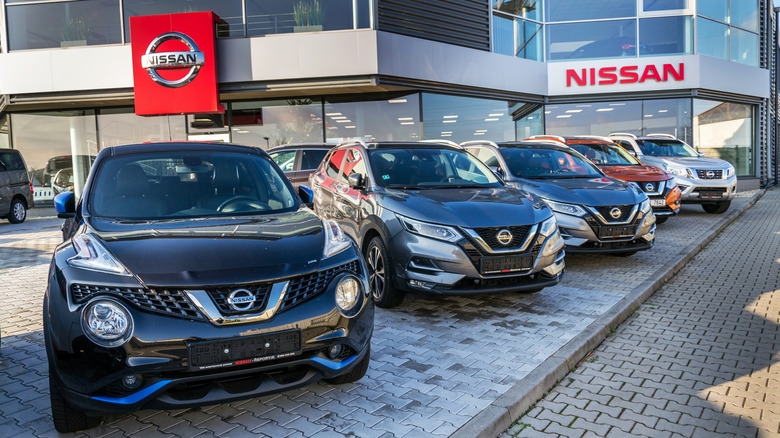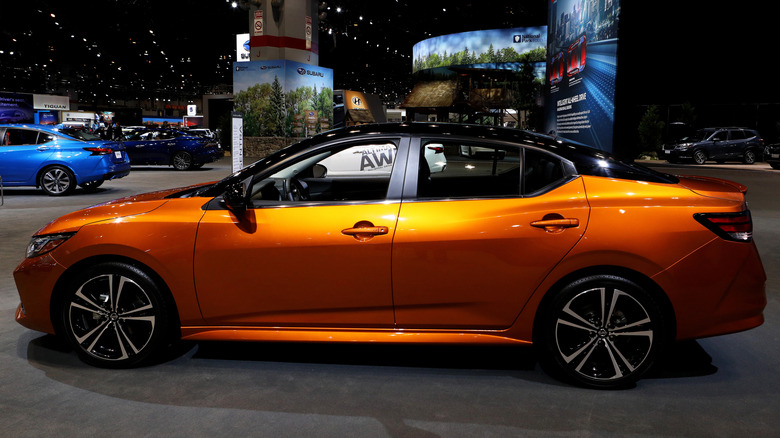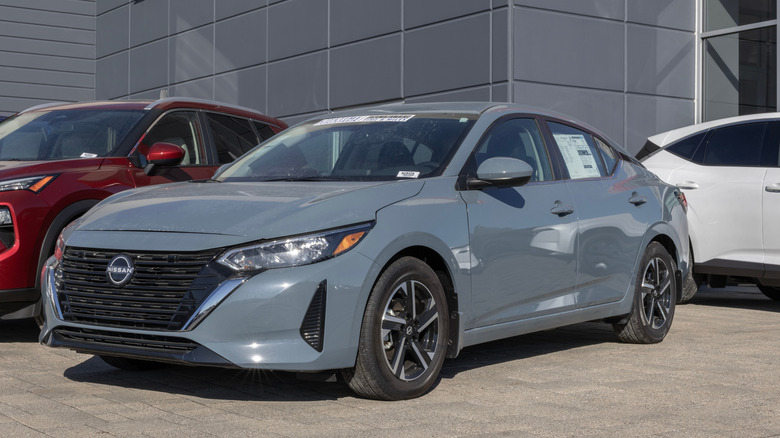Consumer Reports Says This Cheap Nissan Car Is One Of The Best Money Can Buy
Cheaper does sometimes mean better, particularly when it comes to buying an automobile nowadays. Nearly one in five Americans are paying $1,000+ per month on monthly car loan payments, and it isn't clear when (or if) interest rate cuts will make buying a vehicle any easier. So, to help people who need to buy a new car to get around and don't want to tank their credit score by failing to pay huge loan installments on time, Consumer Reports listed its top-rated affordable vehicles. Among CR's top 10 cheap cars is the 2025 Nissan Sentra, a Japanese compact sedan that received an overall score of 78 out of a possible 100.
The manufacturer's suggested retail price range for the Sentra is between $21,590 and $24,590, although its average transaction price is $21,093. And while President Trump's tariffs will make some American cars more expensive, Nissan's executives say they found ways to mitigate the import tax's estimated $3 billion hit on the company. To avoid expensive tariffs in the future, Nissan is exploring the possibility of shifting the production of Sentra, its second-best selling model in the U.S., from Mexico to its plant in Canton, Mississippi, per Automotive News.
The Nissan Sentra can retain a lot of value
CR gave the Nissan Sentra high marks for its ride, handling, controls, braking, and excellent fuel economy (32 miles per gallon). And it wasn't just CR that liked it. Car and Driver called the 2025 Nissan Sentra an "affordable car that doesn't look cheap" with comfy seats and a spacious trunk. Meanwhile, automotive listing website Cars.com noted that its infotainment system is easy to use and can interact fairly quickly with Android Auto and Apple CarPlay.
The Nissan Sentra's recent model years hold a decent amount of value over time. The Nissan Sentra is ranked at No. 33 out of 185 popular model cars with best resale value by CarEdge. Over the course of its first five years, the Nissan Sentra depreciates in value by just 36%, per CarEdge, while iSeeCars has the Sentra's value loss at 40.7% during that time frame. In short, Nissan depreciates at a slower pace than iSeeCars' average depreciation rate of 45.5% over its first five years. Nissan also holds value better than another automobile that made Consumer Report's top 10 recommended cheap cars, the Kia Soul, which can lose an average of 41.8% to 43% of value over five years. Incidentally, and somewhat contradictorily, Consumer Reports also named the 2025 Kia Soul as being amongst the worst new car deals to buy right now due to the tendency of dealers to sell this car at more than $1,000 above its suggested retail price.
Nissan Sentra is a quality car that manages to be dull
Despite generally being considered a good deal overall, the low-priced Nissan Sentra understandably doesn't shine in every category. On the negative side, the National Highway Traffic Safety ordered a recall for nearly 200 Sentras from 2025 for an inadequately secured driver's seat that could increase the risk of injury in a crash. You'll also need to shrink the front-seat passenger legroom in order to install a rear-facing child-safety seat. Consumer Reports noted that the Sentra's standard halogen headlights aren't bright enough for driver's to react to obstacles "from all but the slowest speed," although brighter LED headlights are available for higher-priced trims.
Usually, though, a frequent complaint about the 2025 Nissan Sentra is that it's boring, with Car and Driver describing the Sentra as less fun to take on the road than a Mazda 3 and Honda Civic due to its bland, stiff driving qualities. Edmunds.com noted that the Sentra's performance was "unremarkable." That ho-hum factor might be why just 44% of owners surveyed by Consumer Reports said they'd buy the 2025 Nissan Sentra again.
Boring, however, doesn't mean the Nissan Sentra will be all that cheap to fix. According to CarEdge, a Sentra will cost $5,861 to maintain and repair in its first 10 years, which is $96 more than the average for other popular sedan models. Plus, there's a 17% chance that a Sentra will need a major overhaul in that first decade, a rate that is marginally worse (0.3%) than other sedans.


